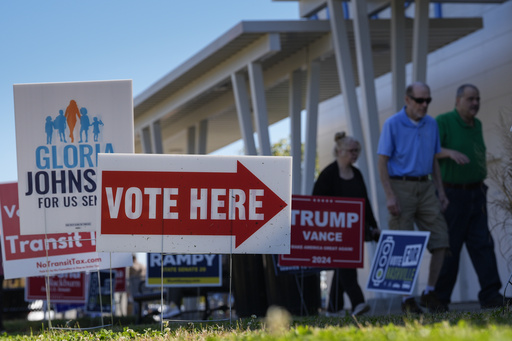
NASHVILLE, Tenn. — The Republican majority in Tennessee’s legislature remains intact following the recent elections, with Democrats unable to gain any ground in several key contests. Unofficial results indicate that the GOP will maintain its control over 75 of the 99 seats in the House, while the Senate will consist of 27 Republicans and just six Democratic members.
Republican Rep. Jeremy Faison, who chairs the House GOP caucus, expressed his satisfaction on social media, stating that the results provided a significant mandate for Republicans at all levels to advance conservative policies that benefit families and workers. He emphasized that the Democrats did not achieve any gains in what he described as a convincing defeat for the minority party.
Despite a difficult national landscape for Democrats, there were some who found solace in retaining their existing numbers. Representative John Ray Clemmons, the chairman of the House Democratic Caucus, commented that while it may not seem like progress, the ability to hold their ground amid challenging circumstances was noteworthy.
Democrats heavily backed Allie Phillips’ campaign to turn a Republican-held House seat north of Nashville, particularly after her story about being denied an abortion in Tennessee attracted nationwide media attention. Phillips faced off against Republican Rep. Jeff Burkhart, but ultimately, Burkhart secured re-election with a nearly 10-point margin.
In Davidson County, Democrat Shaundelle Brooks successfully claimed an open House seat, defeating Republican Chad Bobo. Brooks had a significant lead of almost eight points by the following Wednesday. Her advocacy for gun control was sparked by a personal tragedy: her son was among the victims in a 2018 mass shooting at a Nashville Waffle House.
Meanwhile, attempts by Democrats to make inroads in the Memphis area were unsuccessful, as Republican Rep. John Gillespie won re-election by four points over Democrat Jess Huseth.
With the Republican supermajority preserved, Governor Bill Lee and other leading GOP figures are poised to reintroduce a universal school voucher initiative for Tennessee. On Wednesday, they presented a plan that will permit families to utilize public funds for private school expenses. Earlier this year, Lee proposed a broader voucher initiative but had to pause its implementation due to internal Republican conflicts regarding its execution.
Looking ahead, it remains uncertain if there will be a more unified approach in 2025. During the August primary, Lee supported candidates favoring school choice, and notably, none were defeated.
In Kentucky, voters decisively rejected a measure aimed at allowing public funds to support private or charter school attendance.
In addition, several ballot initiatives regarding various issues were approved by Tennessee voters. In Memphis, there was support for a non-binding measure that called for stricter gun control, including permitting requirements for carrying handguns, a ban on AR-15-style rifles, and a red flag law enabling law enforcement to confiscate firearms from individuals deemed a threat to themselves or others. However, the enactment of this measure relies on the state legislature, which has historically pushed back against such proposals.
In Nashville, residents approved a $3.1 billion transportation initiative aimed at enhancing the city’s bus services, sidewalks, and traffic management systems. To finance these improvements, Davidson County will increase its sales tax by half a cent. Nashville’s Mayor Freddie O’Connell noted that the plan promises significant enhancements to the city’s infrastructure, including improved safety measures for roads and a more efficient transportation network.
